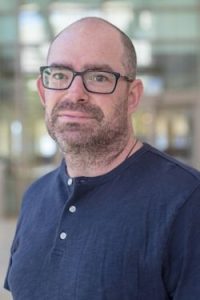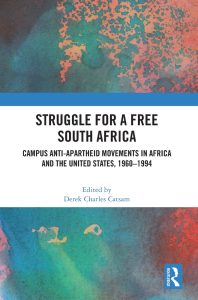
Long fascinated with the Civil Rights and anti-apartheid movements, University of Texas Permian Basin Associate Professor of History Derek Catsam, has edited “Struggle for a Free South Africa: Campus Anti-Apartheid Movements in Africa and the United States, 1960–1994.”
A collection of essays on campus anti-apartheid movements in Africa and the U.S., the book is geared toward libraries and other institutions. Catsam is also the Kathlyn Cosper Dunagan Professor in the Humanities at University of Texas Permian Basin.
This semester, he’s reaching a global sports class using his background as a sports historian to explore international issues. Now that spring is almost here, they are going to throw the rugby ball around and play some cricket.
Catsam also is teaching a graduate course on the 1970s this semester and in the fall he’ll teach his course on the modern presidency and presidential elections.
He also has other books and projects in the works.
The “Struggle for a Free South Africa” explores anti-apartheid movements on university and college campuses across Africa and the United States in the 1970s and 1980s.
In the wake of the March 1960 Sharpeville Massacre in South Africa, the country’s apartheid policies drew increasing critical international attention. By the 1970s, South Africa found itself isolated due to growing sporting, economic and cultural boycotts. Africans across the continent showed solidarity with Black South Africans through a range of boycotts and protests, by hosting South Africans exiled from their home country, and by vilifying the apartheid government at every turn. This volume looks at elite institutions as well as state colleges and universities in the United States, and the actions of university students in Nigeria, Kenya, Ghana, and South Africa during the anti-apartheid movements in the 1970s and 1980s, revealing the local manifestations of a global struggle. The chapters showcase how vibrant campus anti-apartheid movements were, what universal problems emerged, and where unique concerns manifested at a wide range of institutions.

Taking innovative approaches and offering case studies, “Struggle for a Free South Africa” reveals the myriad ways the anti-apartheid struggle manifested in a range of academic environments and how those campaigns have been remembered and documented. This book was originally published as a special issue of Safundi.
“Two books ago was a book on the 1981 Springbok rugby tour to the United States. A lot of what I do is sort of crossover transnational. I’ve done a lot of the articles and that kind of thing on just South Africa; certainly on a whole wide range of issues on apartheid. In fact, this kind of came about by happenstance,” Catsam said.
Doing research, he kept running into student anti-apartheid movements. Campuses big and small across the country were protesting. He got a fellowship at Oberlin college to look at campus anti-apartheid movements.
“I spent a week there just doing work on this, and the more I did, the more I realized what a great project it was and how overwhelming it was. The best way to deal with that was to have other people help do the work so I put out a call for the journal called Safundi that I was on the editorial staff for and did a special issue on campus anti-apartheid,” Catsam said.
They liked it so much that they put Special Issues into Books for Routledge, a prominent London academic publisher.
“(We) went through the process and they approved it. Production went really well. The book itself is mostly geared toward libraries and institutional purchases. It’s by a factor of five, the most expensive book I’ve ever published. But that’s precisely where you want it,” he said.
He wanted the chapters written by his contributors, both students and professors, to really shine through and have the permanence of a book.
“I wrote an introduction to the special issue and then the introduction carried forward to the book. I talked about the anti-apartheid campaigns at Oberlin, the anti-apartheid campaigns in Stanford and Cal, anti-apartheid campaigns at Williams, my undergraduate alma mater in Massachusetts, and then got all these great responses; four from African universities; one from South Africa; one from Ghana; one from Nigeria; and then a really interesting case in Kenya; movements from University of Florida; from Yale; from people who’ve been participants in our internet scholars, Grand Valley State in Western Michigan; University of North Texas by a former UTPB grad student with me … SUNY Brockport and then a chapter on (Students for a Democratic Society), which we associate with the 60s … and then a real interesting thing on it from an archivist who is at Michigan State and wrote a very fantastic collection on anti-apartheid and in general African liberation stuff. With my introduction, it fits really well … I think it more than anything, it will fuel future research, I hope. I think there’s space for lots and lots and lots of work on this and I would love for this to be the springboard for it.”
Production of the book was relatively fast taking about six months.
“I think I probably did the call for papers for the journal in 2021-ish. But the journal came out last year but I think it’s dated 2022 because of COVID issues that delayed journal publication cycles by a year or more. They did a great job. All my contacts at Routledge were really good. The production was super professional, as you’d expect with a major academic publisher,” Catsam said.
He had finished his master’s degree and was just starting his PhD. He had applied for a fellowship from the Rotary Foundation that they don’t offer anymore.
“I got lucky and I knew I didn’t want to spend the year sitting in a pub in Ireland or England, and I knew I didn’t want to spend a year just sitting on the beaches in Australia. I wanted to do something that was connected to my work, civil rights, that kind of thing. The obvious one was South Africa … so I went and spent a year at Rhodes University in South Africa and picked up South Africa as a research and eventually teaching field,” Catsam said.
“I was there for a year in 1997. I was there for a few months in 1999. It became a part of my work and then I’ve gone back every year other than 2020 because of COVID … since 2005. It’s a central part of my work. It’s a central part of my job and obviously has been fruitful for me in terms of producing. I’m a senior research associate with Rhodes University, which is where I was in 1997 as a postgraduate student on this fellowship,” he said.
Writing about rugby comes from playing on the Rhodes University team. He had played high school football and ran track in college. He started out at wing on the rugby team.
“Within literally one minute of my first rugby game I am splayed out on the pitch after being tackled, and it was like everything clicked. I love this. I played for that season that year for the team and then I came back as a fan and I started engaging in it more seriously and started writing about it. For the last 10 years when I go I usually end up getting media passes and covering the Springboks when they play. I’ve covered probably a dozen Springbok matches at this point, sort of wearing my journalist hat and then another bunch of games that you know professional games and other matches and then other South African sports, soccer. I did some writing about the World Cup when it was in South Africa in 2010 and then I went to Brazil and wrote a bunch of articles for the newspaper group that appeared in the OA first and foremost and they were distributed to the other ones. I always had an interest in sports. My first book was on the 2004 Red Sox, sort of labor of love. So that’s where South Africa really came about because I wanted to go abroad and I needed someone else to pay for it,” Catsam said.



